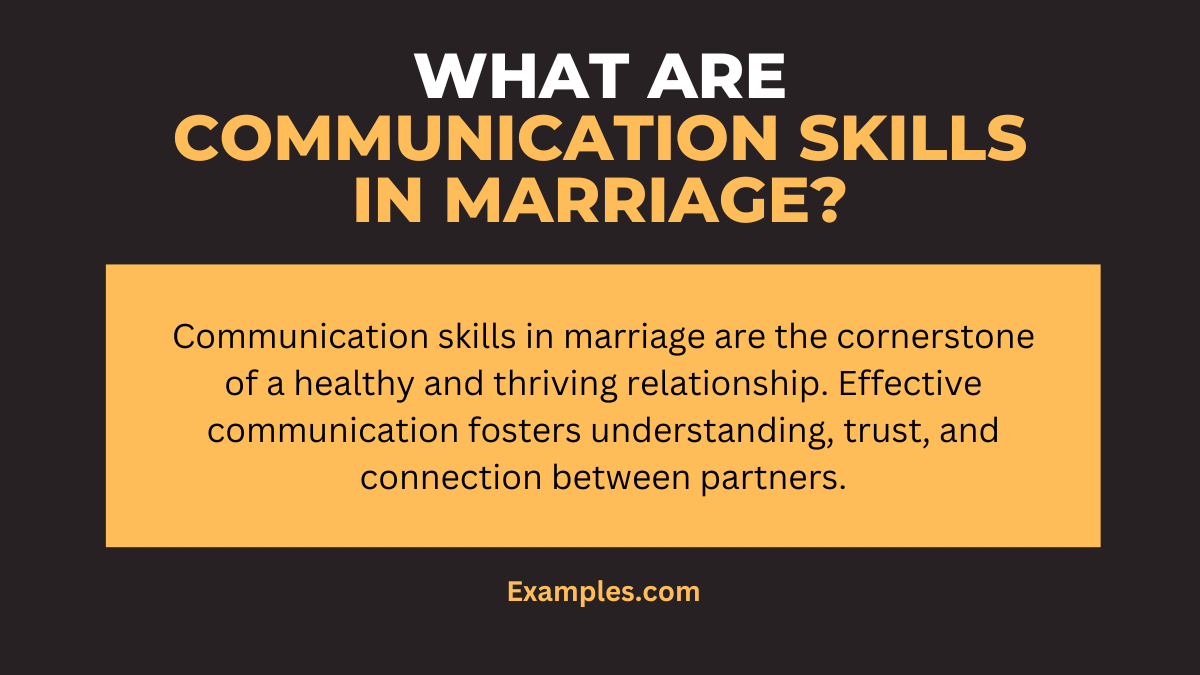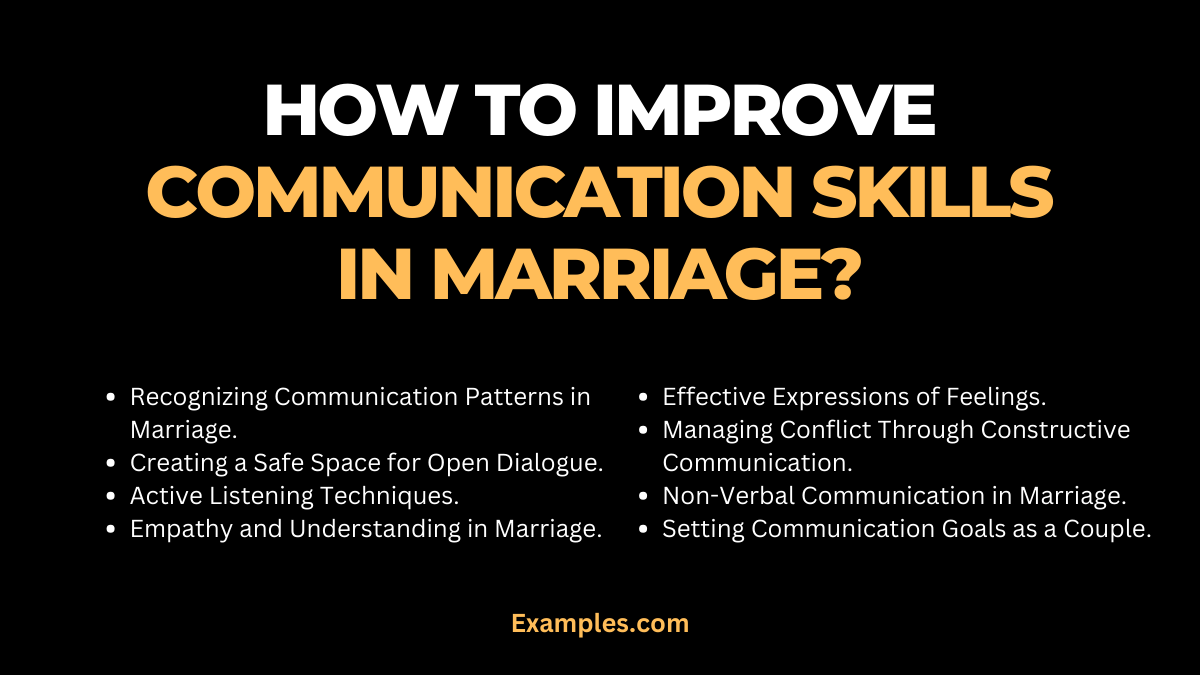29+ Communication Skills in Marriage Examples
Unlock the path to a harmonious union with our comprehensive guide on Communication Skills in Marriage. Nurturing effective communication is the cornerstone of a thriving partnership. Delve into this essential guide that goes beyond words, offering actionable insights and communication examples to fortify your connection. From active listening to expressing emotions, discover how these practices can transform your marital communication, fostering a stronger and more resilient bond. Elevate your relationship with the power of intentional and meaningful communication.
What are Communication Skills in Marriage?

Communication skills in marriage are the cornerstone of a healthy and thriving relationship. Effective communication fosters understanding, trust, and connection between partners. In marriage, communication skills encompass verbal and non-verbal cues, active listening, expressing emotions constructively, and resolving conflicts with empathy. This comprehensive guide explores the crucial aspects of communication skills within the context of marriage, offering insights and strategies to strengthen the bond between spouses.
30 Communication Skills in Marriage Examples
Elevate your relationship with a comprehensive exploration of communication skills in marriage. Delve into 30 impactful examples that enrich the verbal tapestry between partners. From active listening to celebrating achievements, these strategies foster connection and understanding. Enhance your shared language, creating a foundation for enduring love and partnership. Whether acknowledging vulnerabilities or utilizing humor, these examples empower couples to navigate challenges and celebrate the joys of marriage. Strengthen the bonds of your relationship with these diverse and effective communication approaches.
- Active Listening Demonstrate engagement by paraphrasing your partner’s thoughts and feelings.
- Expressing Appreciation Acknowledge your spouse’s efforts with words of gratitude and admiration.
- Open-Ended Questions Foster meaningful conversations by posing questions that encourage elaborate responses.
- Empathetic Responses Show understanding and support by acknowledging your partner’s emotions.
- Non-Defensive Communication Respond to criticism with openness, avoiding defensive reactions.
- Constructive Criticism Offer feedback in a positive and constructive manner, focusing on improvement.
- Conflict Resolution Approach disagreements as opportunities for understanding and compromise.
- Setting Boundaries Communicate and establish boundaries to maintain individual and shared spaces.
- Sharing Vulnerabilities Build trust by opening up about your fears, insecurities, and vulnerabilities.
- Celebrating Achievements Acknowledge and celebrate each other’s successes and accomplishments.
- Non-Verbal Affection Express love through physical gestures like hugs, kisses, and handholding.
- Expressing Expectations Communicate clear expectations to avoid misunderstandings and disappointments.
- Using Humor Lighten tense moments with humor, fostering a positive atmosphere.
- Quality Time Communication Allocate dedicated time for meaningful conversations without distractions.
- Expressing Forgiveness Verbalize forgiveness after resolving conflicts, promoting emotional healing.
- Planning Together Discuss future plans collaboratively, ensuring shared goals and aspirations.
- Sharing Daily Experiences Communicate about your day, sharing experiences and thoughts with your partner.
- Active Problem-Solving Approach challenges as a team, actively seeking solutions together.
- Expressing Love Languages Identify and cater to each other’s love languages for more meaningful connections.
- Joint Decision-Making Involve each other in decision-making processes, fostering a sense of partnership.
- Acknowledging Feelings Validate your partner’s emotions, showing empathy and understanding.
- Expressing Needs Clearly Communicate your needs explicitly, promoting clarity and understanding.
- Setting Relationship Goals Discuss and establish shared goals to work towards together.
- Appreciating Differences Acknowledge and appreciate the unique qualities and differences in your partner.
- Maintaining Calmness Practice maintaining a calm demeanor during discussions to promote healthy dialogue.
- Apologizing Sincerely Apologize genuinely and take responsibility when necessary.
- Reflective Listening Repeat back what your partner said to confirm understanding and show attentiveness.
- Expressing Trust Communicate and reinforce trust in your partner through words and actions.
- Providing Emotional Support Offer emotional support during challenging times, demonstrating solidarity.
- Celebrating Anniversaries Mark milestones and anniversaries with heartfelt communication and expressions of love.
Why Are Communication Skills Important in Marriage?

In the intricate dance of marriage, effective communication skills stand as pillars, shaping the foundation of a healthy and thriving partnership.
1. Enhancing Emotional Connection
Effective communication in marriage fosters a deep emotional connection between partners. It involves the art of expressing feelings, thoughts, and desires openly, creating an environment of understanding and empathy.
2. Resolving Conflicts Amicably
Navigating disagreements is a natural part of any marriage. Developing strong communication skills equips couples with the tools to address conflicts constructively, fostering compromise and resolution.
3. Building Trust and Transparency
Transparent communication builds trust, a cornerstone of a successful marriage. Openness about thoughts, concerns, and aspirations creates a secure foundation for both partners to rely on.
4. Strengthening Intimacy
Communication is the bridge to intimacy in marriage. Expressing desires, being attuned to each other’s needs, and engaging in meaningful conversations deepen the emotional and physical connection between partners.
5. Navigating Life Transitions Together
As life unfolds, effective communication becomes essential in navigating transitions. From major decisions to daily routines, the ability to communicate openly ensures that both partners are on the same page, fostering unity and support.
The seas of marital communication requires commitment, patience, and the continuous refinement of these skills. By prioritizing effective communication, couples can build a resilient and fulfilling partnership that stands the test of time.
What are the Key Communication Skills in Marriage?
Marriage thrives on effective communication, fostering understanding and connection. Exploring key communication skills in marriage ensures a harmonious and fulfilling relationship.
- Active Listening in Marriage: In marital communication, active listening is paramount. Demonstrate genuine interest in your partner’s words, fostering a sense of being heard and understood.
- Expressing Emotions Responsively: Encourage open expression of emotions, creating a safe space for vulnerability and connection.
- Clear and Concise Communication: Clarity is essential. Use simple and direct language, avoiding misunderstandings.
- Constructive Conflict Resolution: Address conflicts with a solution-oriented mindset, focusing on resolution and growth.
- Non-Verbal Communication Cues: Pay attention to non-verbal cues like body language and gestures, enhancing understanding and connection.
- Empathy in Marital Communication: Cultivate empathy to truly understand your partner’s perspective, fostering a deep emotional connection.
- Effective Communication in Intimacy: Communication plays a crucial role in intimate moments. Express desires and boundaries openly and respectfully.
- Establishing Healthy Communication Habits: Develop consistent and healthy communication habits, ensuring a strong foundation for marital connection.
Navigating the landscape of communication skills in marriage enriches the marital bond, creating a resilient and thriving partnership.
How to Improve Communication Skills in Marriage?

Effective communication is the cornerstone of a thriving marriage. Explore practical strategies to enhance communication skills in marriage and strengthen the bond between partners.
1. Recognizing Communication Patterns in Marriage
Understanding existing communication patterns is the first step towards improvement. Identify common themes, both positive and challenging, to gain insight into areas for growth.
2. Creating a Safe Space for Open Dialogue
Establish an environment where both partners feel comfortable expressing themselves. Encourage open dialogue by actively listening, avoiding judgment, and validating each other’s perspectives.
3. Active Listening Techniques
Implement active listening techniques to foster understanding. Practice reflecting back what your partner communicates, ensuring clarity and demonstrating genuine interest.
4. Empathy and Understanding in Marriage
Cultivate empathy to comprehend your partner’s emotions and viewpoints. Acknowledge their feelings and show understanding, reinforcing a sense of emotional connection.
5. Effective Expressions of Feelings
Develop the skill of articulating feelings constructively. Encourage the use of “I” statements to express emotions, minimizing blame and fostering a collaborative approach.
6. Managing Conflict Through Constructive Communication
Address conflicts with a focus on resolution rather than blame. Explore constructive ways to express concerns and work together towards mutually beneficial solutions.
7. Non-Verbal Communication in Marriage
Recognize the impact of non-verbal cues on communication. From body language to facial expressions, understanding non-verbal signals enhances overall marital communication.
8. Setting Communication Goals as a Couple
Work together to establish communication goals that align with the unique dynamics of your marriage. Define areas for improvement and celebrate achievements along the way.
Improving communication skills in marriage requires commitment, understanding, and a willingness to evolve together. By implementing these strategies, couples can create a foundation for healthy communication, fostering a lasting and fulfilling partnership.
Tips for Effective Communication Skills in Marriage
Navigating the complexities of marriage requires a foundation of strong communication skills. Enhance your connection with your partner through these insightful tips.
1. Establish Open Lines of Communication
In a marital relationship, fostering open and honest communication is paramount. Encourage transparency by creating a safe space for both partners to express their thoughts and feelings without fear of judgment.
2. Practice Active Listening
Active listening is the bedrock of effective communication. Demonstrate genuine interest in your partner’s words, paraphrase to confirm understanding, and respond empathetically. This fosters a deeper understanding of each other’s perspectives.
3. Choose Appropriate Timing for Discussions
Timing plays a crucial role in communication. Select optimal moments for important discussions to ensure both partners are emotionally available and receptive. Avoid tackling sensitive topics during stressful times.
4. Use “I” Statements to Express Feelings
Transform potential conflicts into constructive conversations by using “I” statements. Express your feelings without assigning blame, allowing for a more collaborative resolution to disagreements.
5. Be Mindful of Non-Verbal Cues
Communication extends beyond words. Pay attention to non-verbal cues such as body language and facial expressions. Understanding these subtleties contributes to a more nuanced and empathetic communication dynamic.
6. Seek Professional Guidance if Needed
Sometimes, challenges in communication may require external support. Consider couples therapy or counseling to navigate deeper issues constructively. A neutral professional can provide valuable insights and tools.
Incorporating these tips into your marital communication toolkit can lead to a more connected and fulfilling relationship. Strengthening communication skills in marriage lays the groundwork for a resilient and enduring partnership.
In conclusion, mastering effective communication skills in marriage is an ongoing journey that holds the key to a resilient and fulfilling partnership. By integrating the diverse array of examples discussed, couples can weave a robust tapestry of understanding, empathy, and connection. Remember, communication is not just about words; it’s about creating an environment where both partners feel heard, valued, and supported. As you embark on this journey, consider seeking additional insights and resources from reputable sources.
For a deeper understanding of relationship dynamics, explore insightful articles on renowned relationship counseling services, such as Couples Therapy at Mayo Clinic. Mayo Clinic, known for its medical expertise, provides valuable insights into nurturing healthy connections.
Additionally, discover effective communication strategies rooted in research and psychology with articles from Psychology Today’s Relationship Section. Psychology Today’s platform offers expert perspectives, ensuring a wealth of knowledge to further enhance your communication skills and fortify the foundation of your marriage. Embrace these resources to continue fostering a communicative and thriving marital bond.



